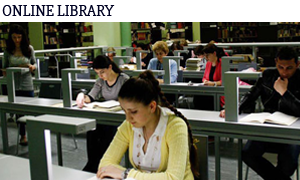
FACULTY OF ECONOMICS AND BUSINESS
STRATEGY FOR INCREASING THE COMPETITIVENESS OF GEORGIA
Assessing Georgia’s economic competitiveness and identifying the obstacles blocking competitiveness have been the two main focal points for economic scholars at TSU, as the competitiveness index determines investor attitudes and consequently the country’s real economic prospects. Therefore, in 2009 Associate Professor Gulnaz Erkomaishvili at the Faculty of Economics and Business began a study to determine which tools are necessary, and what means are available, to put economic policies in place and raise national competitiveness.
According to the 2015 Global Competitiveness Report of the World Economic Forum, Georgia is ranked 66thof 140 countries. In 2014it was ranked only 69th; in 2012-2013 – 77th; 2011-2012 – 88th; 2009-2010 – 90th. Thus for the fifth year there has been a positive trend for Georgia, which now precedes Slovakia (67th), Montenegro (70th), Croatia (77th), Ukraine (79th), Greece (81st), Armenia (82nd), Moldova (84th), Albania (93rd) and Serbia (94th).
These rankings have a significant effect on investment. Investors’ positive attitudes towards a country promote a growth of investment flows, which is an important precondition for economic growth and reducing unemployment. Employment still remains one of the most pressing issues in Georgia. The aim of this research has been to present the competitive advantages of Georgia; to assess the role of competitiveness in sustainable development to improve public welfare; and to reveal gaps in the country’s economy. These determine the prospects for development.
To form a competitive economy the state should pursue an economic policy oriented towards a dynamic transformation of its industrial structures, especially export-oriented sectors (investment and export subsidies, tax preferences, assistance in difficult economic situations, etc). An export-oriented strategy has been a major factor in the economic development of many countries such as Singapore, Hong Kong, South Korea and Taiwan. 
Trade integration is an important stage in the process of economic integration between countries, as economic globalization promotes efficient distribution and use of international resources. It encourages the optimal specialization of a country and increases the production capacity of the global economy. To some extent Georgia’s recent export structure reflects this. Copper ores and concentrates were on top of the list of Georgia’s exports in the first ten months of 2015 with 11%, followed by ferro-alloys – 9%; re-export of vehicles – 24.7% (a sharp decrease compared to 2012); nuts – 8%; medicines – 6%; other products – 57%. In the opinion of foreign experts and Georgian specialists, Georgia has a very highpotential for producing agricultural goods and foods for export.
Georgia has faced a trade gap for several years. From January to October 2015, imports exceeded exports by 3.4. However, this is an improvement compared to 2007 when imports exceeded exports four-fold. Stable development and raising competitiveness are impossible without increasing exports in trade turnover, and this has become an important priority for overcoming poverty.
According to the state statistics office (www.geostat.ge) in January to October 2015, Georgia’s top export trading partners wereAzerbaijan (12%), Bulgaria (10%), Turkey (9%), Armenia (8%) and Russia (7 %). During the same period Georgia’s top import trading partners wereTurkey (17%), China (8%), Russia (7%),Azerbaijan (7%) and Ukraine (6%).
From an export perspective, five economic sectors have the greatest growth potential: agriculture and processing industries, hydropower, transport, financial institutions and tourism. Georgia can be successfully involved in an international distribution of labor by developing traditional sectors such as agricultural production and foodstuffs. Considering traditional sectors of the economy, goods produced by local entrepreneurs in cooperation with foreign partners are more in demand by the international market. Franchising is another interesting sector for producing competitive goods, especially in the tea and canning industries.
The demand for drinking water is steadily increasing. Bottled water production (of both still and sparkling mineral water) has taken a lead in Georgia’s economy because of its high quality (30 % comes from the highest quality sources of underground drinking water), cheap price, and the stability of these natural resources that have no seasonality. Most importantly, there is a return on invested capital within a short period of time, and Georgia is situated in the midst of countries that suffer from a shortage of drinking water. Georgia’s water resources per capita are 2.5 times more than the world average, 2.4 times more than Europe and 1.7 times more than Asia. Waters from Borjomi, Sairme, Lugela, Utsera and other areas are unique for their ionic composition.
 In recent years there has been an increased demand for herbal medicines worldwide, and a demand for medicinal plants has also increased in Georgia. Herbal medicines make up a significant part of the total volume of drug exports for Georgia, as the flora in the region is rich in medicinal plants, which is a sector that could be developed by greater production and processing. The state should encourage the production of ecologically friendly drugs and attract foreign investors. The rational use of natural resources such as medicinal plants could mean a growth of export revenues, new jobs and the reduction of poverty in rural areas.
In recent years there has been an increased demand for herbal medicines worldwide, and a demand for medicinal plants has also increased in Georgia. Herbal medicines make up a significant part of the total volume of drug exports for Georgia, as the flora in the region is rich in medicinal plants, which is a sector that could be developed by greater production and processing. The state should encourage the production of ecologically friendly drugs and attract foreign investors. The rational use of natural resources such as medicinal plants could mean a growth of export revenues, new jobs and the reduction of poverty in rural areas.
Georgia could increase its competitive advantage not only through traditional industries, but also through high-quality, high-technology and highly productive manufacturing industries. This is the only way to ensure the long-term sustainable growth of competitiveness, wages and incomes. Such sectors could include pharmaceuticals, telecommunications equipment and tools, including machine tools. More attention should be paid to producing expensive, high quality high-tech goods that will reduce the import/export gap.
The competitiveness of Georgia on the global market largely depends on service sectors as well, including tourism. Developing resorts and tourism can help access the international market, especially through the geographical proximity of Europe, its major tourism market. A national tourism development policy should be created, aiming to liberalize the sector and promote both foreign and local investment.
A modern legal framework is essential for developing the tourism sector. Today the Law of Georgia on Tourism and Resorts (adopted in 1997 with amendments in1999-2000) and the Law of Georgia on Protective Sanitary Zones of Health Resorts and Resort Localities are the only laws that address appropriate conditions, but they fail to meet modern requirements. New trends and technologies mean that over the last decade international requirements have changed, and laws need updating for tourism development in Georgia.
Spending time in the natural environment increases well-being, and in Georgia’s wellness industry medical tourism has increased. Georgia’s diversity of tourist sites, recreational resources and high biodiversity are found in diverse climatic zones, the sea and rivers, mountains and forests, with diverse opportunities like mineral waters, healing mud, magnetic sand, medicinal plants and, wine therapy. These could offer a world-class wellness industry.
Studies show that institutional reforms are not enough to improve the country’s competitiveness significantly, however some major problems exist: regional political instability, potential conflict zones; high loan interest rates; gaps in tax legislation; lack of key infrastructures; irrelevance of qualifications; and inflation. Nevertheless, the World Economic Forum recognized that Georgia has made progress in several sectors: institutions, macroeconomic indicators, higher education, and labor market efficiency.
Thus researchers make several recommendations to increase competitiveness. The state should support an attractive investment environment with access to preferential loans, effective insurance systems and infrastructures. Local food production should be encouraged, not only by households, but also by SME farms and agro-food processing enterprises; there should be more technical assistance available for employment, and international marketing strategy assistance training. Qualified and highly skilled workforces need a modern system of science and education, consulting and extension services. Investors need a stable legal environment to ensure protection of their property. A database on investment projects and relevant information on investment possibilities should be available to international investors.
Only if the share of exports in total trade turnover increases will stable development and higher Georgian competitiveness be possible.
Publications: 1. The Strategy for Increasing the Competitiveness of Georgia, International Conference on Economics, Industrial and Business Management. Barcelona, Spain, 27-28 October, 2014. 2.The Strategy for Increasing the Competitiveness of Georgia (Duplicate). International Journal of Social, Management, Economics and Business Engineering, 8(10), 2014, International Science Index 94. 3. Priorities of Economic Development of Georgia (scientific paper), Tbilisi, publisher Universal, 2013. 4. Economic policy, defining national competitiveness in Georgia. Збiрник наукових праць Соцiально-економiчний розвиток Украiни: Еропейський вибiр. Мелiтополь, 2013. 5. Economic Policy of Georgia Determiner of National Competitiveness. Economics and Business #6, 2010. 6. Economic Policy of Georgia Determiner of National Competitiveness; scientific conference Economic and Business Development Trends in Georgia, collection of scientific works, June 26, Tbilisi, 2000. 7. International Business: Important Factor of Raising Economic Competitiveness – Business and Economics #5, 2009.




